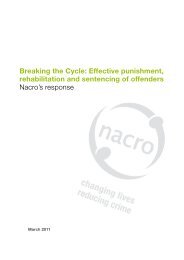Applying for work (with a criminal record): resettlement - Nacro
Applying for work (with a criminal record): resettlement - Nacro
Applying for work (with a criminal record): resettlement - Nacro
You also want an ePaper? Increase the reach of your titles
YUMPU automatically turns print PDFs into web optimized ePapers that Google loves.
Keeping <strong>record</strong>s<br />
As of 31 March 2006, the ACPO<br />
guidelines on keeping <strong>record</strong>s no longer<br />
apply.<br />
Please contact <strong>Nacro</strong>’s Resettlement Plus<br />
Helpline on 020 7840 6464 <strong>for</strong> advice<br />
about the new guidelines.<br />
Resettlement practitioner guide <strong>Applying</strong> <strong>for</strong> <strong>work</strong><br />
Part 2 How to disclose<br />
Often disclosure will result in rejection. In some<br />
instances, however, employers will still consider<br />
someone if they do not think the conviction is<br />
relevant. If a person is not offered a job, it might be<br />
because they do not have exactly the right skills or<br />
experience or another candidate may simply have<br />
been better qualified.<br />
People will improve their employment prospects by<br />
going about disclosure in the right way. They need to<br />
reassure employers that they are not a risk, and that<br />
their offending is in the past. There<strong>for</strong>e, if the<br />
conviction is old, they can point this out. If the<br />
conviction is more recent but the offence was much<br />
older, they can point this out too.<br />
If they were convicted when they were young,<br />
perhaps as a teenager, and they have matured and<br />
taken on family, mortgage and other responsibilities<br />
since then which mean that they have too much to<br />
lose by getting into trouble, they can point this out<br />
also.<br />
If the convictions are not relevant to the job, they<br />
should say so. If they took responsibility <strong>for</strong> the<br />
offence – if <strong>for</strong> instance they owned up to it<br />
immediately or pleaded guilty – then they should say<br />
so. If they committed the offence because they were<br />
having particular problems at the time and these have<br />
been resolved, they should explain this.<br />
If the offence sounds more serious than it is, they<br />
should explain this too. All offence categories cover a<br />
wide range of behaviours from the minor to the very<br />
serious. A sexual offence, <strong>for</strong> instance, covers<br />
everything from consensual homosexual acts and<br />
young men having sex <strong>with</strong> their under-aged<br />
girlfriends to indecent assault and rape. Burglary<br />
covers everything from taking goods from shop<br />
storerooms to entering the homes of old people,<br />
leaving them in fear.<br />
If the context behind the behaviour would help to<br />
minimise the seriousness of the offence, they should<br />
highlight this. The context will vary from the<br />
mitigating to the sorely aggravating. For instance, a<br />
person in fear who in defence assaults someone who<br />
is threatening them is not as culpable as an individual<br />
who causes serious injury <strong>with</strong> intent.<br />
However, they must be careful that mitigation of this<br />
sort does not sound like an excuse. An employer will<br />
not want to know. They should try and put<br />
themselves in the employer’s position and ask<br />
3

















